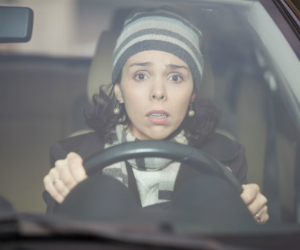A History of Stress May Contribute to Anxiety Behind the Wheel
 At least once in our lives, nearly all of us will be in some kind of car accident. Statistics from the car insurance industry estimate that the average American driver will file a collision claim about once every 18 years. Over the course of your driving lifetime you’re likely to rack up three or four accidents.
At least once in our lives, nearly all of us will be in some kind of car accident. Statistics from the car insurance industry estimate that the average American driver will file a collision claim about once every 18 years. Over the course of your driving lifetime you’re likely to rack up three or four accidents.
For many people, the experience of a car accident can trigger anxiety about driving. Anxious driving behaviors have been shown to impair driving performance, leading to more mistakes on the road and higher odds of another accident. But not everyone who experiences a car accident ends up developing anxiety behind the wheel.
In a recent study, a team of psychological scientists led by Joshua D. Clapp of the University of Wyoming looked at whether stressful events unrelated to driving could make someone more vulnerable to developing anxious driving behaviors after an accident.
The researchers surveyed 317 college students who had been in traffic accidents but who also still currently drive a car. The participants were asked to rate the severity of their accident and whether the accident led to distressing feelings like fear or helplessness.
To assess stress history, the researchers asked participants to complete an adapted measure that asked whether they had ever experienced various traumatic events, such as the death of a family member or surviving a major illness.
A standardized driving behavior survey was used to determine whether participants engaged in dangerous anxious driving behaviors, like frequently making driving errors or driving way below the speed limit.
Contrary to expectations, the severity of the accident itself wasn’t associated with developing anxious driving behaviors. Rather, participants’ emotional responses to their accidents predicted whether they developed all of the key anxious driving behaviors–but this was true only for those who had experienced high rates of stress in other parts of their lives (i.e., more than four of the stressful life events).
For participants who reported fewer stressful life events, there was no association between distress from the accident and anxious driving behavior.
“As hypothesized, accident distress– indexed by ratings of fear, helplessness, danger, control, and certainty of death – demonstrated a positive relationship with anxious driving behaviors specifically among participants endorsing a large number of stressful life events,” Clapp and colleagues write in .
Because there was no measure in the study for whether car accidents happened before or after stressful life events, Clapp and colleagues cautioned that more research would be needed to better understand the impact of stress on people’s susceptibility to anxious driving.
Reference
Clapp, J. D., Olsen, S. A., Danoff-Burg, S., Hagewood, J. H., Hickling, E. J., Hwang V. S., Beck, J. G. (2011). Factors contributing to anxious driving behavior: The role of stress history and accident severity. Journal of Anxiety Disorders, 25(4), 592–598. DOI: 10.1016/j.janxdis.2011.01.008





APS regularly opens certain online articles for discussion on our website. Effective February 2021, you must be a logged-in APS member to post comments. By posting a comment, you agree to our Community Guidelines and the display of your profile information, including your name and affiliation. Any opinions, findings, conclusions, or recommendations present in article comments are those of the writers and do not necessarily reflect the views of APS or the article’s author. For more information, please see our Community Guidelines.
Please login with your APS account to comment.